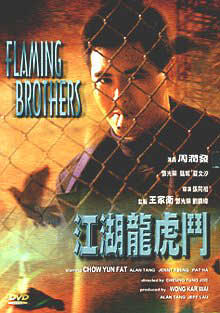Flaming Brothers

Director: Joe Cheung
Year: 1987
Rating: 6.0
This 1987 “Heroic
Bloodshed” film followed on the heels of the success of A Better Tomorrow
and it too delves into the world of the triads and ritualistic male bonding.
In most ways it falls very short of A Better Tomorrow, but it has some interesting
aspects to it.
The three main male actors all were major
stars in their respective decades. Patrick Tse was a major heartthrob during
the 1960s (and is the father of current heartthrob Nicholas Tse), Alan Tang
was one of the top romantic stars of the 1970’s (in particular in Taiwan where
he teamed up a few times with Brigitte Lin) and of course Chow Yun Fat was
the biggest male actor of the 1980s. All three are terrific actors and seeing
them together is a treat.

A year before his directorial debut As Tears Go By, Wong Kar-wai penned
this script for producer, Alan Tang. I can’t say there is anything in the
script that gives a hint of the promise of things to come from Wong – but
that is not too surprising as directors tend to often dramatically change
the substance and mood of scripts to their own liking. What is clear though
is that Tang thought enough of it and of Wong to produce both As Tears Go
By and Days of Being Wild.

In many of these male-bonding films, there is often much conjecture about
the subtext of homosexuality within (much of it nonsense in my opinion). Though
perhaps inadvertent, the English title “Flaming Brothers” almost seems to
mock this. What was the Chinese title – “No, We’re Just Good Friends”? In
a number of instances in the film other characters make pointed references
that unless the two friends – Tang and Chow – find girlfriends everyone will
think they are lovers. Needless to say, they always take offense at this suggestion!

Outside of this though, the film is often flat and slow moving. Almost from
the beginning you know exactly where the film is heading – but it takes a
circuitous path getting there. There are a couple decent action sequences
– but the film becomes bogged down in three love stories – the men’s ones
with the women – and of course the underlying one with each other.

Tang and Chow grow up together – both orphans – and depend completely on
one another into their adult years. They open a ritzy nightclub in Macao,
but almost immediately run into trouble in the form of big triad honcho Patrick
Tse and his right hand man Norman Tsui. They want to sell drugs in the club
and Tang being the righteous man he is tells them that “pimping, robbing,
gun smuggling” is all fine and dandy – but no drugs. Tse doesn’t take kindly
to this rejection.

Tang goes to Thailand to complete an arms deal – and a good shoot out and
a tuk-tuk chase occurs on the streets on Bangkok – and he falls in love with
a lounge singer (Jenny Tseng). Back in Macao Chow comes across the little
girl he knew as a child – all grown up into Pat Ha -and one look into
her sweet honey dew eyes and he is ready to forsake the triad life and his
life long friend. But the life pulls him back – as his friend, Alan, has to
face Tse on his own – and Chow knows he has to be there too. The last twenty
minutes of the film turns into one excellent guns a blazing blood bath.
My rating for this film: 6.0






